Veranstaltungsarchiv Thomas Mann House
Januar 2024
Oper und Demokratie: Konzert & Podiumsdiskussion mit Daniela Smolov Levy, Kira Thurman, Alex Ross, Jan Vogler & Kai Hinrich Müller
Los Angeles
Das Thomas Mann House und Musikwissenschaftler Kai Hinrich Müller (2023 Fellow) laden zu einer transatlantischen Gesprächs- und Konzertreihe ein, die sich jener Kunstform widmet, die auch für Thomas Mann eine große Leidenschaft war: die Oper. Im Zentrum steht ihr demokratisches Potenzial, das in verschiedenen Veranstaltungen in den USA und Deutschland erkundet wird. Wie kann Oper zu einer vielfältigen und inklusiven demokratischen Gemeinschaft beitragen? Diese Veranstaltung im Thomas Mann House ist der erste Event der Reihe Oper und Demokratie. In Kollaboration mit dem Kaleidoscope Chamber Orchestra, Jan Vogler & friends.
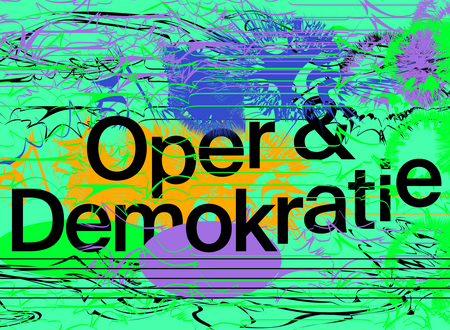
Ausgangspunkt der Veranstaltungsreihe ist die Erinnerung an die Wiedereröffnung der legendären Berliner Krolloper nach dem Ersten Weltkrieg im Jahr 1924, die eines der führenden Opernhäuser der Zwischenkriegszeit war und heute ein Symbol für die Erneuerung der Oper im 20. Jahrhundert sowie für den Kampf um demokratische Werte in Zeiten der Krise ist. Podiumsdiskussionen mit internationalen Wissenschaftler:innen und Künstler:innen widmen sich der Geschichte dieser prestigeträchtigen Institution und fragen nach den mannigfaltigen Beziehungen von Oper und Demokratie in der heutigen Zeit. Im Zentrum stehen das demokratische Potenzial der Oper und ihre möglichen Beiträge zu einem vielfältigen und inklusiven Miteinander. Diskutiert werden u. a. Aspekte der Demokratisierung von Oper, Fragen von Macht und Repräsentation, neue Formate, Besetzungs- und Programmpolitik, Erwartungen des Publikums sowie wissenschaftliche Herausforderungen und die Möglichkeiten der Institution, gerade auch verfolgten und unterrepräsentierten Künstler:innen eine Stimme zu geben. Begleitende Konzerte stellen Auszüge aus selten aufgeführten Bühnenwerken vor, teils von verfolgten Künstler:innen, teils aus Archiven als Weltpremieren.
Am 20. Januar 2024 wird die Reihe mit einer Veranstaltung im Thomas Mann House eröffnet: Zwei Konzerte, eine Keynote-Lecture und eine Podiumsdiskussion werden sich mit dem demokratischen Potenzial der Oper befassen. Werke von Kurt Weill, Lily Reiff, Richard Wagner und Edmond Dédé werden vom Kaleidoscope Chamber Orchestra und dem renommierten Cellisten Jan Vogler aufgeführt. An der Podiumsdiskussion nehmen mit Alex Ross, Kira Thurman und Daniela Solomon Levy drei renommierte Intellektuelle des internationalen Operndiskurses teil. Abgerundet wird das Programm durch eine Rede über eine Operngeschichte der Vielfalt von Michael Steinberg, einem Experten für US-amerikanische Musikwissenschaft.
Programm
Part I
Begrüßungsansprache & Einleitung
Einleitung von Joy H. Calico
Der Jasager, Klavier Oper bei Kurt Weill vorgetragen von Kaleidoscope Chamber Orchestra
Kurt Weills Schuloper Der Jasager wurde 1930 an der Krolloper in Berlin uraufgeführt: Der Komponist Kurt Weill und der Dichter Bertolt Brecht setzten sich mit dem Verhältnis zwischen Individuum und Gesellschaft (und umgekehrt) und der Idee einer „Übereinkunft“ auseinander, die sie in den Mittelpunkt der Handlung stellen. Am Ende beschließt der Protagonist, ein Junge, „ja“ zu sagen und sich für die Gemeinschaft zu opfern. Die Musik wird in einem Konzert mit dem Kaleidoscope Chamber Orchestra präsentiert.
Part II
Ja sagen? Oper und Demokratie im 21. Jahrhundert, Podiumsdiskussion mit Alex Ross, Kira Thurman, Daniela Smolov Levy, moderiert von Kai Hinrich Müller
In Anlehnung an Kurt Weills Der Jasager wird die Podiumsdiskussion die politischen Stimmen von Opernmachern im öffentlichen Diskurs sowie das „ja“ zur Institution Oper selbst untersuchen. Kai Hinrich Müller, Alex Ross, Kira Thurman und Daniela Smolov Levy diskutieren über die Demokratisierung des Musiktheaters, Zugänglichkeit, Vielfalt und gesellschaftliches Engagement sowie die Verantwortung der Oper im Sinne eines politischen Auftrags der Künste. Wie können Opernhäuser und Künstler:innen zur Stärkung demokratischer Werte beitragen, und wie kann die Institution Oper selbst in ihren Programmen, Erzählungen, Strukturen und Entscheidungsprozessen demokratischer werden?
Part III
Die Operngeschichte der Vielfalt, Keynote von Michael Steinberg
Salonkonzert mit Werken von Richard Wagner, Lily Reiff, Edmond Dédé gespielt von Jan Vogler & Freunden
Michael Steinberg leitet das Salonkonzert mit einer Auseinandersetzung mit einem der wichtigsten Aspekte der Beziehung zwischen Oper und Demokratie ein: der Vielfalt, die sich auch in der Institution Oper auf verschiedenen Ebenen widerspiegeln muss. Das Konzert mit Jan Vogler, einem der weltweit führenden Cellisten und Intendanten der Dresdner Musikfestspiele, präsentiert Musik von Richard Wagner, Lily Reiff und Edmond Dédé. Während ersterer der wohl bekannteste Komponist politischer Opern ist, sind die beiden anderen heute weitgehend vergessen. Lilly Reiff führte in Zürich einen bedeutenden Salon - Thomas Mann war einer ihrer Gäste und widmete ihr einen Abschnitt in seinem Doktor Faustus -, komponierte aber auch. Auszüge aus ihrer Oper Puck's Love Song werden zum ersten Mal in den Vereinigten Staaten aufgeführt. Auch der afroamerikanische Komponist Edmond Dédé hat trotz schwerer Rassendiskriminierung eine beeindruckende, fast unmögliche musikalische Karriere gemacht. Er wurde 1823 in New Orleans geboren und zog nach Frankreich, wo er als Dirigent und Komponist große Erfolge feierte. Dieses Konzert bietet eine Auswahl seiner Werke.
Teilnehmer:innen:
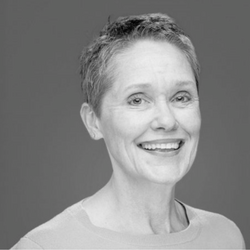
Joy H. Calico ist seit 2023 Professorin für Musikwissenschaft an der Herb Alpert School of Music und Lehrbeauftragte für Jüdische Studien an der UCLA. Sie hat Monographien über zwei Persönlichkeiten der deutsch-österreichischen Diaspora in Los Angeles veröffentlicht: Bertolt Brecht at the Opera (2008) und Arnold Schoenberg's A Survivor from Warsaw in Postwar Europe (2014), beide bei University of California Press. Ihre wissenschaftliche Arbeit wurde durch Stipendien und Zuschüsse der American Academy in Berlin, des DAAD, der ACLS und der NEH unterstützt, unter anderem. Sie ist Mitglied der internationalen Arbeitsgruppe des Black Opera Research Network (BORN).
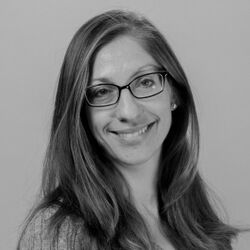
Daniela Smolov Levy untersucht die Demokratisierung der Oper in der amerikanischen Gesellschaft, einschließlich der Präsenz der Oper im jiddischen Theater des frühen zwanzigsten Jahrhunderts und der Beteiligung jiddischsprachiger Menschen an der breiteren amerikanischen Opernszene. Daniela hat einen Doktortitel in Musikwissenschaft von der Stanford University, einen Master-Abschluss in Klavierspiel von der New York University und einen Bachelor-Abschluss in vergleichender Literatur und Musik von der Princeton University. Sie hat ihre Arbeit sowohl auf nationalen als auch auf lokalen Tagungen der American Musicological Society vorgestellt und hat auf Einladung Vorträge in Los Angeles (UCLA und California Institute for Yiddish Culture and Language) und New York (Jewish Music Forum) gehalten. Ihr Artikel "Parsifal auf Jiddisch? Why Not?" wurde 2014 in der Zeitschrift Musical Quarterly veröffentlicht. Sie hat am Pomona College und an der University of Southern California unterrichtet.
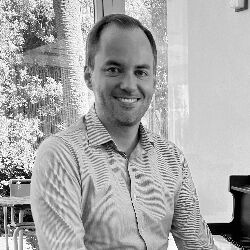
Thomas Mann Fellow Kai Hinrich Müller studierte an der Rheinischen Friedrich-Wilhelms-Universität Bonn Musikwissenschaft, BWL und Rechtswissenschaft und wurde 2013 mit einer Arbeit zur Geschichte der Alte-Musik-Bewegung promoviert. 2022 folgte seine Habilitation. Er beschäftigt sich in seiner Forschung mit Richard Wagner und seiner Rezeption im Bayreuther Kreis sowie der völkischen Bewegung, mit Formen von Antisemitismus in der Musikgeschichte, dem Musikleben der Zwischenkriegs- und insbesondere NS-Zeit sowie der transatlantischen Operngeschichte mit besonderem Blick auf das amerikanische Exil. Er lehrt an der Hochschule für Musik und Tanz Köln, leitet Projekte im In- und Ausland und ist wissenschaftlich-künstlerischer Leiter der Terezín Music Academy im ehemaligen Ghetto Theresienstadt und des Bauhaus Music Weekend.
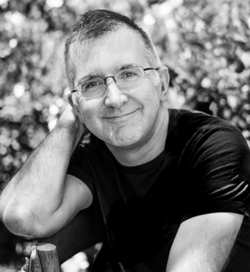
Alex Ross ist seit 1996 Musikkritiker bei The New Yorker. Sein erstes Buch, The Rest Is Noise: Listening to the Twentieth Century, wurde mit dem National Book Critics Circle Award ausgezeichnet und war Finalist für den Pulitzer-Preis. Sein zweites Buch, Listen to This, ist eine Sammlung von Essays. Sein neuestes Buch ist Wagnerism: Art and Politics in the Shadow of Music, eine Abhandlung über Wagners enormen kulturellen Einfluss. Für The New Yorker hat er häufig über Thomas Mann und die Emigrantengemeinde in L.A. geschrieben.
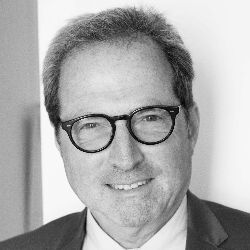
Michael P. Steinberg ist Barnaby Conrad und Mary Critchfield Keeney Professor für Geschichte sowie Professor für Musik und Germanistik an der Brown University in Providence, Rhode Island, USA. Von 2016 bis 2018 war er Präsident der American Academy in Berlin. An der Brown University war er Gründungsdirektor des Cogut Center for the Humanities (2005-2015), Vice Provost for the Arts (2015-16) und Mitglied des Academic Priorities Committee (2019-20). Er ist Empfänger von Stipendien der John Simon Guggenheim Foundation, des American Council of Learned Societies und des National Endowment for the Humanities. Zu Steinbergs Büchern gehören The Afterlife of Moses: Exile, Democracy, Renewal (Stanford, 2022), The Trouble with Wagner (Chicago, 2018) sowie der Sammelband Makers of Jewish Modernity (Princeton, 2016; Gewinner des National Jewish Book Award für Sachliteratur).
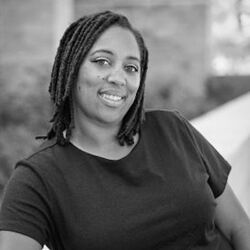
Kira Thurman ist eine preisgekrönte Historikerin und Musikwissenschaftlerin. Die klassisch ausgebildete Pianistin, die in Wien aufgewachsen ist, promovierte an der University of Rochester in Geschichte mit einem Nebenfach Musikwissenschaft an der Eastman School of Music. Ihr Buch, Singing Like Germans: Black Musicians in the Land of Bach, Beethoven and Brahms (Cornell University Press, 2021), zeichnet die Geschichte schwarzer klassischer Musiker im deutschsprachigen Raum während des 19. und 20. Thurman hat für Magazine wie die New York Times, The New Yorker und Frieze Magazine geschrieben und ist in Dokumentarfilmen und öffentlichen Radioprogrammen von PBS in Deutschland und den Vereinigten Staaten aufgetreten.
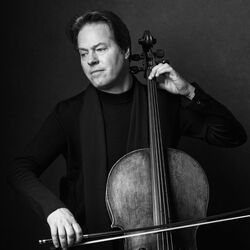
Jan Vogler is a renowned German-born classical cellist. Vogler’s distinguished career has brought him together with renowned conductors and internationally acclaimed orchestras around the world, such as New York Philharmonic, Leipzig Gewandhaus Orchestra, Deutsches Symphonie-Orchester Berlin and London Philharmonic Orchestra. His great ability allowed him to explore the sound boundaries of the cello and to establish an intensive dialogue with contemporary composers and artists. This includes regular world premieres, including works by Tigran Mansurian (with WDR Symphony Orchestra conducted by Semyon Bychkov), John Harbison (with Mira Wang and the Boston Symphony Orchestra), and many more.
Informationen zum Event:
Nur auf Einladung
Ort:
Thomas Mann House
Student Council zu "Democracy and Vulunerability" – mit Sophie-Charlotte Opitz
Online
Online Interview | 16:00 Uhr (PT)
Das Wende Museum, dublab radio, und das Thomas Mann House laden sie ein zur ersten Folge unserer monatlichen Interviewreihe zum Thema "Democracy & Vulnerability!" Wie sollte eine Demokratie mit ihren eigenen Schwachstellen umgehen? Wie müssen sich Demokratien entwickeln, um erfolgreich mit den weltweit zunehmenden ökologischen Krisen, geopolitischen Spannungen, wirtschaftlichen Ungleichheiten und Kulturkriegen umzugehen? Wie viel Verwundbarkeit kann eine Demokratie ertragen?

*Diese Veranstaltung findet in englischer Sprache statt*
The Student Council consists of a team of highly engaged, talented, and diverse high school, undergraduate, and graduate students who invite prominent guest speakers to discuss topics relating to art, culture, politics, and society. In conversation with academics, journalists, politicians, and artists, the students will explore the various threats to democratic institutions and principles worldwide, as well as strategies to potentially overcome these threats. The series focuses on the new annual topic of the Thomas Mann House, “Democracy & Vulnerability:" Democratic processes are dynamic, inclusive, and human-centered but at times also messy, arbitrary, and even contrary to democracy itself. How should a democracy deal with its own vulnerabilities? What are the responsibilities of a democracy toward the most vulnerable in its populace? How do democracies need to evolve to deal successfully with increasing global levels of ecological, geo-political, and economic precarity? How much vulnerability can a democracy endure?
The first guest for the 2024 council will be Thomas Mann Fellow, Media Studies Scholar & Curator Sophie-Charlotte Opitz, whose work focuses on the relationship of protest movements, image strategies and artificial intelligence.
January Speaker
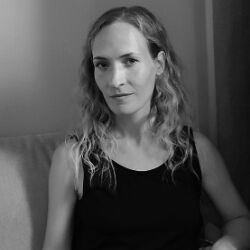
Sophie-Charlotte Opitz is a media and memory studies scholar and curator. She studied philosophy and art education at Goethe University Frankfurt and subsequently completed her doctorate. In 2019 she began her curatorial practice as a fellow at the Akademie Schloss Solitude in Stuttgart and afterwards worked internationally as a curator and director in museums in Germany, Switzerland, and England. In addition to her monograph „Bilderregungen. Die Produktionsmechanismen zeitgenössischer Kriegsfotografie“, she regularly publishes in academic journals, exhibition catalogues, and photography books, especially on aspects of collective memory cultures and global image politics. She is a 2023 Thomas Mann Fellow. In her project, she is researching new forms of protest which strengthen political visibility during critical times.
Meet the 2024 Student Council
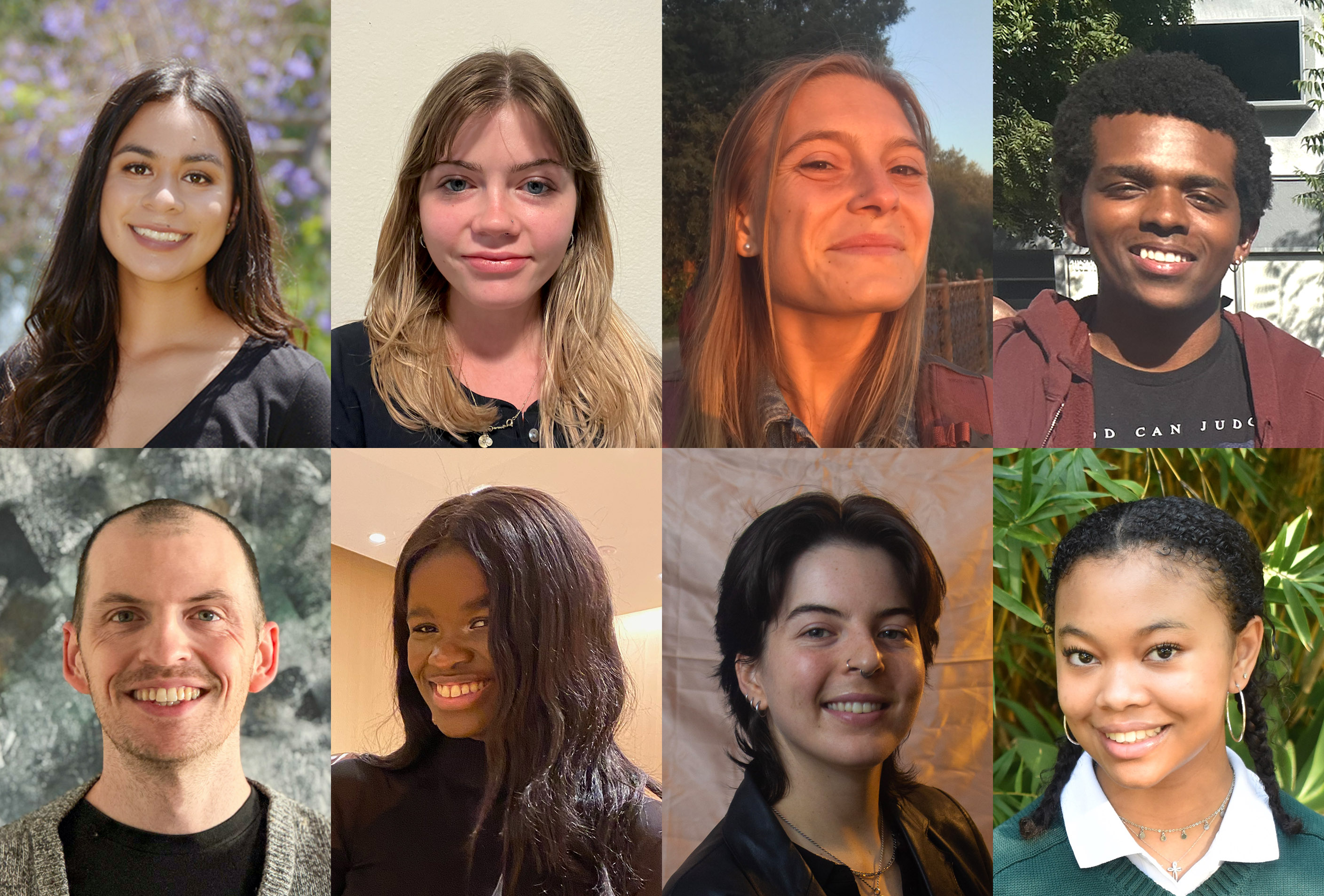
Sara Abrahamsson is a fourth-year student at UCLA studying Art History and French. As a culmination of her artistic and academic interest in political graphics, Sara is currently writing her senior thesis paper on the internationalist poster art of post-revolutionary Cuba. Upon graduating, she plans to continue working in museums before pursuing graduate studies in Art History or Art Conservation.
Amy Cabrales is a First-Generation fourth-year undergraduate student at UCLA, studying Sociology and the Russian Language. She is a Mexican-American, Los Angeles native born in Lynwood, California. Her career interests include cross-cultural education via museum work or language instruction and immigrant resettlement, while her academic interests include immigrant integration and self-identity across immigrant generations. She is anticipating returning to Almaty, Kazakhstan for the 2024-25 academic year to inform these interests and advance her Russian proficiency.
Elsa Coony is a fourth-year student at the University of California, Los Angeles double majoring in Global Studies and German. She has previously worked at the United States Holocaust Memorial Museum as both a docent and translator and is excited to join this year's council. In the future, she hopes to pursue a career in international development.
Biruke Dix is currently a 2nd year student at UCLA studying Applied Mathematics. He joined the Wende Student Council in 2024 and is deeply invested in the ever-changing properties of art as well as social habits. He hopes that he can create language and conversation that promotes the spread of cultural shifts and social justice.
Matthew Jones is a third-year PhD student in Claremont Graduate University’s Cultural Studies and Museum Studies program. His research currently explores how sites connected to authoritarian regimes function as pilgrimage destinations and what strategies states and institutions employ to reduce extremist attachment at these sites. He is thrilled to continue his training with the Wende Museum through this collaboration with the Thomas Mann House.
Emma Larson is a master's student at Columbia University's Harriman Institute of Russian, Eurasian, and Eastern European Studies. There, she focuses on the gender, social, and political history of Central Asia. Before starting at Columbia, Emma taught English in Kazakhstan with the Fulbright Program. She graduated from Williams College with degrees in History and Russian in 2021.
Zora Nelson is a current undergraduate student at New York University, where she is studying Harp Performance and Media, Culture, and Communication. As an east coaster born and raised in Philadelphia, Pennsylvania, she discovered the Wende Museum in the summer of 2022 and is honored to be a part of the council. With a passion for writing, Zora sees a future in storytelling to promote social justice.
Lexi Tooley is a current sophomore at the University of Pennsylvania majoring in Political Science and Art History, minoring in Chinese Language and Culture. She is originally from Los Angeles, California, and attended the Archer School for Girls. Lexi has been working with the Wende Museum for the past 2 years. She looks forward to continuing the search for truth and examining the vulnerability of democracy through this program!
Coalition in Distress? The Rise of the Far Right in Germany and its Potential Consequences for the State Elections in 2024 – Vortrag & Gespräch mit Andrea Römmele & Bruce Bimber
Los Angeles
2024 Thomas Mann Fellow & Politikwissenschaftlerin Andrea Römmele & Professor für Politikwissenschaft Bruce Bimber (UC Santa Barbara) geben Einblicke in die bevorstehenden deutschen Landtagswahlen 2024 aus transatlantischer Perspektive.
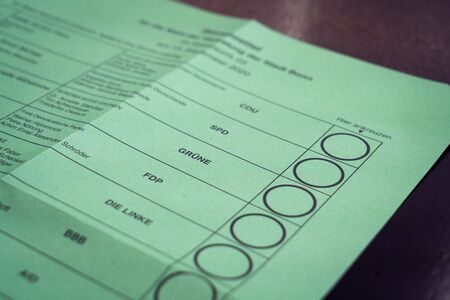
*Diese Veranstaltung findet auf englischer Sprache statt*
Fall 2023 marks the midterm of the German "traffic light“ coalition, named after the parties' traditional colors: the Social Democratic Party of Germany (SPD), the Free Democratic Party (FDP) and Alliance 90/The Greens. After presenting a progressive reform agenda in December of 2021, the Russian attack on the Ukraine has challenged the German government, among others, resulting in a so-called Zeitenwende, a historic turning point, that is supposed to unify the country. However, transformation is not progressing. Internal struggles characterize the administration of chancellor Olaf Scholz. The support of the far right-party (AfD) is rising to record highs. The state elections in the fall of 2024 in the federal states of the former East will serve as a critical bench mark for future developments in Germay’s political landscape.
In her presentation, Andrea Römmele will evaluate the government’s performance and discuss potential future scenarios for Germany and beyond. Afterwards, Andrea Römmele will engage in a conversation about the topic with Bruce Bimber, Distinguished Professor of Political Science at UC Santa Barbara, who will be comparing populist trends in campaigns in the U.S and Germany from a transatlantic perspective.
During her time at the Thomas Mann House, Andrea Römmele explores the impact that major societal megatrends – such as technology and AI, urbanization, demographic and social change, climate change and resource scarcity, or global growth markets – have on democracies. How do different systemic and societal structures in Germany and the U.S. affect these developments?
The event will take place at the Thomas Mann House (1550 N San Remo Drive, Pacific Palisades) on Thursday, January 25 at 7 pm.
Attendance information
Attendance to this event is by invitation only.
Teilnhemerin

Andrea Römmele is Professor of Political Communication and Dean and Vice President at the Hertie School in Berlin. She holds a master’s degree from San Francisco State University, a doctorate from the University of Heidelberg, and a habilitation from Freie Universität Berlin. Römmele’s research interests include digital democracy, elections, and electoral campaigns and parties. For Römmele, a central issue is mediating between science and practice. One of her current projects is the “Democracy Report,” developed jointly with ARD, which she moderates herself.

Bruce Bimber is Professor of Political Science. He works closely with the Center for Information Technology and Society, which he founded in 1999. He is also affiliated with the Department of Communication. He studies political communication, with a focus on the relationship between digital media and patterns in human behavior, especially in the domains of political organization and collective action. Professor Bimber s a Fellow of the American Association for the Advancement of Science, a Fellow of the International Communication Association, and a past Fellow of the Center for Advanced Study in the Behavioral Sciences.








